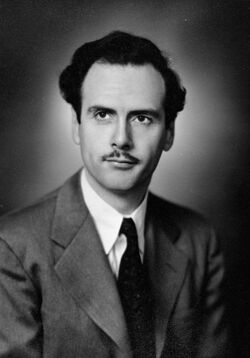Marshall McLuhan (nonfiction): Difference between revisions
No edit summary |
|||
| (10 intermediate revisions by the same user not shown) | |||
| Line 1: | Line 1: | ||
[[File:Marshall_McLuhan.jpg|thumb|Marshall McLuhan circa 1936.]]'''Herbert Marshall McLuhan''', CC (July 21, 1911 – December 31, 1980) was a Canadian professor of English, philosopher of communication theory and a public intellectual. | [[File:Marshall_McLuhan.jpg|250px|thumb|Marshall McLuhan circa 1936.]]'''Herbert Marshall McLuhan''', CC (July 21, 1911 – December 31, 1980) was a Canadian professor of English, philosopher of communication theory and a public intellectual. | ||
His work is viewed as one of the cornerstones of the study of media theory, as well as having practical applications in the advertising and television industries. | His work is viewed as one of the cornerstones of the study of media theory, as well as having practical applications in the advertising and television industries. | ||
| Line 5: | Line 5: | ||
He was educated at the University of Manitoba and Cambridge University and began his teaching career as a Professor of English at several universities in the U.S. and Canada, before moving to the University of Toronto where he would remain for the rest of his life. | He was educated at the University of Manitoba and Cambridge University and began his teaching career as a Professor of English at several universities in the U.S. and Canada, before moving to the University of Toronto where he would remain for the rest of his life. | ||
McLuhan is known for coining the expressions the medium is the message and | McLuhan is known for coining the expressions "the medium is the message" and "global village", and for predicting the World Wide Web almost thirty years before it was invented. | ||
Although he was a fixture in media discourse in the late 1960s, his influence began to wane in the early 1970s. | Although he was a fixture in media discourse in the late 1960s, his influence began to wane in the early 1970s. | ||
== Quotes == | |||
<blockquote> | |||
Until more than two centuries after printing nobody discovered how to maintain a single tone or attitude throughout a prose composition. | |||
</blockquote> | |||
—''The Gutenberg Galaxy'': | |||
<blockquote> | <blockquote> | ||
… the alphabet produced militarism ('King Cadmus sowed the dragon's teeth, and they sprang up armed men') … the phonetic alphabet was the greatest processer of men for homogenized military life that was known to antiquity. | |||
</blockquote> | </blockquote> | ||
—''Understanding Media'' ([https://twitter.com/GnomonChronicl1/status/1776837361390743826 Post] @ Twitter) | |||
== | == In the News == | ||
<gallery mode="traditional"> | <gallery mode="traditional"> | ||
File:John Killian Houston Brunner circa 1967.jpg|link=John Brunner (nonfiction)|[[John Brunner (nonfiction)|John Killian Houston Brunner]] circa 1967. | |||
</gallery> | </gallery> | ||
== Fiction cross-reference == | |||
* [[John Brunner]] | * [[John Brunner]] | ||
* [[Gnomon algorithm]] | |||
* [[Gnomon Chronicles]] | |||
== Nonfiction cross-reference == | == Nonfiction cross-reference == | ||
* [[John Brunner (nonfiction)]] | * [[John Brunner (nonfiction)]] | ||
* Howard Luck Gossage (1917–1969)is credited with introducing Marshall McLuhan to media and corporate leaders, thereby providing McLuhan his entry into mainstream renown. | * [https://en.wikipedia.org/wiki/Howard_Gossage Howard Gossage} - Howard Luck Gossage (1917–1969), "The Socrates of San Francisco," is credited with introducing Marshall McLuhan to media and corporate leaders, thereby providing McLuhan his entry into mainstream renown. | ||
== External links== | == External links == | ||
{{Template:Ext links: Marshall McLuhan}} | |||
[[Category:Nonfiction (nonfiction)]] | [[Category:Nonfiction (nonfiction)]] | ||
[[Category:Communication (nonfiction)]] | |||
[[Category:Marshall McLuhan (nonfiction)]] | |||
[[Category:People (nonfiction)]] | |||
[[Category:Writers (nonfiction)]] | |||
Latest revision as of 08:00, 9 April 2024
Herbert Marshall McLuhan, CC (July 21, 1911 – December 31, 1980) was a Canadian professor of English, philosopher of communication theory and a public intellectual.
His work is viewed as one of the cornerstones of the study of media theory, as well as having practical applications in the advertising and television industries.
He was educated at the University of Manitoba and Cambridge University and began his teaching career as a Professor of English at several universities in the U.S. and Canada, before moving to the University of Toronto where he would remain for the rest of his life.
McLuhan is known for coining the expressions "the medium is the message" and "global village", and for predicting the World Wide Web almost thirty years before it was invented.
Although he was a fixture in media discourse in the late 1960s, his influence began to wane in the early 1970s.
Quotes
Until more than two centuries after printing nobody discovered how to maintain a single tone or attitude throughout a prose composition.
—The Gutenberg Galaxy:
… the alphabet produced militarism ('King Cadmus sowed the dragon's teeth, and they sprang up armed men') … the phonetic alphabet was the greatest processer of men for homogenized military life that was known to antiquity.
—Understanding Media (Post @ Twitter)
In the News
John Killian Houston Brunner circa 1967.
Fiction cross-reference
Nonfiction cross-reference
- John Brunner (nonfiction)
- [https://en.wikipedia.org/wiki/Howard_Gossage Howard Gossage} - Howard Luck Gossage (1917–1969), "The Socrates of San Francisco," is credited with introducing Marshall McLuhan to media and corporate leaders, thereby providing McLuhan his entry into mainstream renown.
External links
- Marshall McLuhan @ Wikipedia
- The medium is the message @ Wikipedia
- [] @ YouTube

